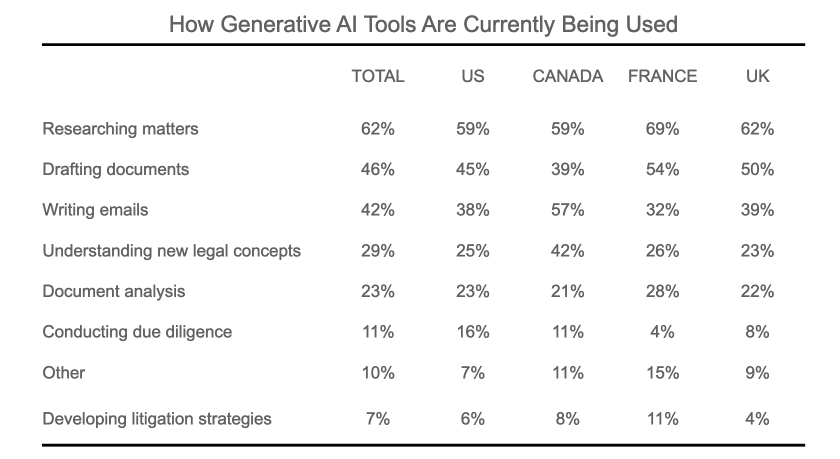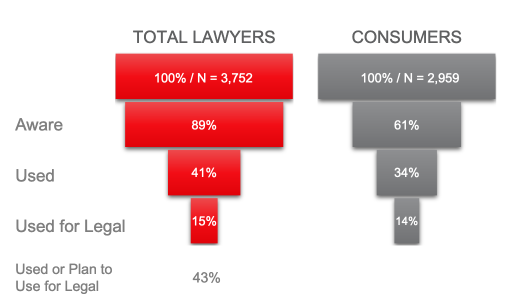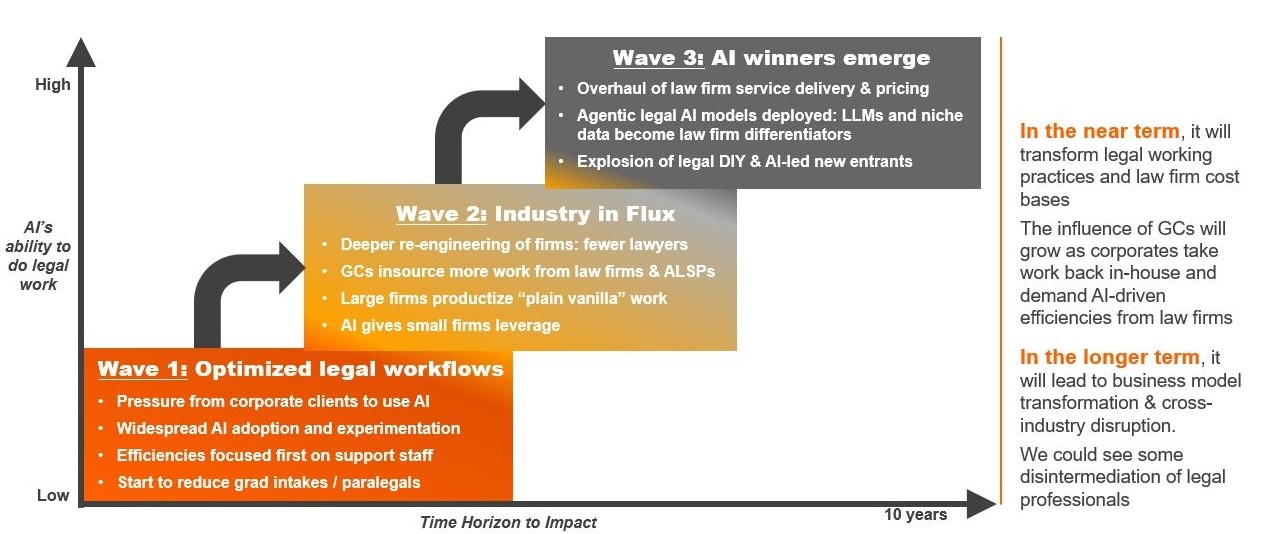The legal industry is at the edge of a new era defined by generative artificial intelligence. This transformation is more than technological; it involves rewriting the foundations of law, which are based on loose forms of information and natural languages. These developments have seen a rise in LegalTech startups that focus on AI-first as a disruptor within the sector. As data sovereignty and structural challenges pose significant barriers to adoption, this field should experience major transformations.
The recent spike of AI into legal industry reflects an inclination towards embracing novel approaches. Based on the International Legal Generative AI Report by LexisNexis, there is an emerging pattern where legal professionals use AI increasingly for such functions as document review, compliance checking and legal research among others. The fact that it has been accepted proves how much influence AI wields in changing the entire workflow within the legal framework.

Generative AI: A New Dawn in LegalTech
In the past, innovation in LegalTech was focused mainly on making law processes more efficient through structured techniques. Nevertheless, the introduction of generative AI, notably recent large language models (LLMs), has brought some new hope into legal activities. These are scalable and approachable as never seen before in this industry capacity to process huge amounts of text and generate it into orderly and meaningful information. According to Harvard Law School’s Professor David Wilkins, AI technologies like ChatGPT are transforming legal disciplines by automating tasks, enhancing decision-making capabilities, and even predicting legal outcomes. These developments not only increase efficiency but also redefine what it means to be a lawyer.
Investment and Innovation: The Rising Tide of AI in LegalTech
The legal sector is undergoing significant changes with the integration of AI, as highlighted in the International Legal Generative AI Report. This report notes a marked increase in AI-driven LegalTech startups, indicating the sector’s move towards AI to enhance efficiency and innovation in legal services. It shows a growing trend of legal professionals adopting AI for various tasks, signaling the industry’s readiness to adapt to a future where legal processes are increasingly influenced by technology. The shift towards AI is not just about adoption but also how it’s woven into the legal practice fabric, suggesting a redefined approach to legal services in an AI-centric future.

Technical Solutions and Market Dynamics
Emerging technical solutions are addressing the challenges of generative AI in law, such as accuracy and data privacy. Techniques like Retrieval Augmented Generation (RAG) and prompt engineering are enhancing the reliability and applicability of LLMs in legal contexts, revealing promising areas for AI-driven innovation.
Insights from Thomson Reuters’s technology and legal market experts, including TR Labs, reveal how AI might reshape legal practices in profound ways over the next decade:
The first wave, already unfolding, sees widespread AI adoption and experimentation within corporate legal departments and law firms of all sizes. This stage focuses on enhancing back-office functions and optimizing labor costs, with a looming reevaluation of traditional hiring practices.
The second wave predicts a transformation of the legal business model within three to five years. As AI boosts efficiency, the billable hour model will be reimagined to better capture value added through advanced technology.
The third wave envisions advanced AI integration, enabling more complex legal tasks and potentially reshaping practice areas differently.

Challenges and Ethical Considerations
Despite AI’s promising prospects, its adoption is not without challenges. Issues of data ownership, ethical considerations, and the necessity for regulatory frameworks are at the forefront of the discourse on AI in law, highlighting the active engagement within the legal community to navigate these challenges.
Established Players and New Entrants: Navigating the AI Landscape
Incumbent and new entrant legal tech providers are at a generative AI crossroads. Incumbents must decide whether to develop AI internally or partner with fast-moving innovators, potentially defeating their market standing and operational efficiency.
For new entrants, the rapidly evolving AI landscape presents hurdles, but also opportunities. They will need to be strategic in their positioning and partnership choices in order to succeed. The interplay of offering innovative solutions while integrating into existing legal tech ecosystems is key.
This dynamic between incumbents and newcomers reflects a broader industry trend toward more agile, AI-focused legal solutions. As generative AI matures, its integration into legal services means firms must reassess not only their technology stacks but also their business models and how they engage clients.
The report by Stanford Law School on the generative AI legal landscape in 2024 provides an extensive analysis of these trends. It dives into how AI is shaping legal practices, what it means for data handling and privacy and the competitive dynamics between incumbents and newcomers. This level of examination offers key insights as firms adapt for a tech-enabled future.
Understanding these nuances will be crucial for stakeholders across the industry to plan accordingly in an increasingly AI-centric world.
Future Outlook: Embracing AI’s Potential
The future trajectory of the law sector is closely tied up with advancements made in artificial intelligence. Although the capacity of AI to enhance legal services is significant, there are also many ethical and practical issues that need addressing before this transition can be considered successful. Legal professionals must commit to perpetual learning and flexibility to ensure that AI’s integration bolsters the sector’s value and maintains its ethical standards.
After recent data revealed that even traditionally slow-to-change industries like law have begun to embrace the benefits provided by artificial intelligence, it should come as no surprise that there’s now an opportunity for various expanded applications of this technology in legal practices too. Identifying these trends and understanding the impact that AI will have on the legal field are key to any firm looking to get ahead of its competitors, allocate money effectively and innovate.






